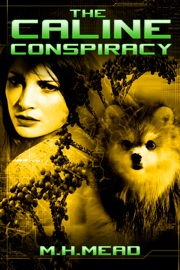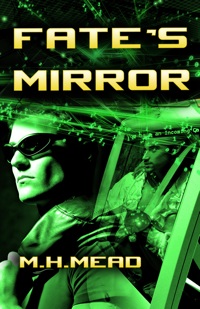For some authors, genre is obvious. Their book is a cozy mystery, or a historical romance, or a space opera. Not everyone writes in tidy categories, though, which brings in the problem of selecting a spot for it in the bookstore (even digital stores have categories for organizing ebooks) and writing a blurb that lets people know what they’ll be getting. Nobody’s out there searching for “cross-genre” stories. So, as independent authors who must wear the hats of publishers and marketers as well, what do we do?
Today we have a guest poster, actually a writing team, Harry Campion and Margaret Yang, to mull on this topic for us:
Will the real genre please stand up?
Like most writers, we read a lot. Like most readers, we read some of everything, from mystery  to fantasy to YA. But the books that really get our hearts thumping and our brains twirling are books about the near future. We love picturing life in the decades to come. We love imagining how current technology will change, and how society will change because of it. We love thinking about the kinds of characters who will live in that world.
to fantasy to YA. But the books that really get our hearts thumping and our brains twirling are books about the near future. We love picturing life in the decades to come. We love imagining how current technology will change, and how society will change because of it. We love thinking about the kinds of characters who will live in that world.
So, naturally, our first novel, FATE’S MIRROR, is about a super hacker in the year 2043. THE CALINE CONSPIRACY, set in the same time period, is about a private investigator trying to save a genetically engineered dog accused of killing its owner. Our books look forward to the future. In a way they also look backward, to classics by Neal Stephenson, William Gibson, and Bruce Sterling. But they’re very contemporary books, with the pacing of a modern-day thriller.
So what genre are they? What are we supposed to call them? We once had a famous New York agent. He spent a couple of fruitless years submitting our manuscripts to traditional publishers. We saw the rejection letters—all of them from top-notch editors. The science fiction editors said our books “weren’t science fiction enough” and the mystery/thriller editors said “we don’t publish science fiction.”
But here’s the funny thing. Readers don’t care. They want a good story, well told. They understand that genre is a marketing label that helps publishers and bookstores, but has very little to do with what interests the reader. We don’t know anyone who exclusively reads a single genre and we bet you don’t either. And when genres blend, we like it even more.
 Once we became independent authors, the most unlikely demographic found our books. Our novels cross age and gender lines, but do especially well with college-educated women in generation X. Nobody knew how to market a thriller/science fiction mashup to them, but it didn’t matter. Thanks to the way indie books are sold directly to readers, the people who like our kind of books could now find them. Our readers decide for themselves what to call our books when recommending them to friends—some say sci-fi, some say cyberpunk, and some even call them technological mythology.
Once we became independent authors, the most unlikely demographic found our books. Our novels cross age and gender lines, but do especially well with college-educated women in generation X. Nobody knew how to market a thriller/science fiction mashup to them, but it didn’t matter. Thanks to the way indie books are sold directly to readers, the people who like our kind of books could now find them. Our readers decide for themselves what to call our books when recommending them to friends—some say sci-fi, some say cyberpunk, and some even call them technological mythology.
So, what do we call FATE’S MIRROR and THE CALINE CONSPIRACY? Sometimes we say they are “Science fiction for people who read thrillers.” Sometimes we say, “They are near-future adventures.” Mostly, we say, “It’s a book we wrote about a hacker who saves the world” or “It’s a book about a genetically engineered pet who may or may not have killed its owner.” The reader doesn’t really want to know what kind of book it is. He wants to know if it sounds like a book he’ll enjoy reading.
If you have to slap a label on it, this is the book I would like is the very best genre label of all.
Bio:
M. H. Mead is the shared pen name of Margaret Yang and Harry R. Campion.
Margaret Yang is a writer and parent who lives in Ann Arbor, Michigan. She loves living in the modern age, and can’t wait for the day when she has her own flying car. Although parenting, writing and reading fill her days, her true mission in life is to find the perfect slice of key lime pie.
Harry R. Campion is a writer, teacher, and parent who lives in Harper Woods, Michigan. He and his librarian wife are doing their part to bring up the next generation of readers. In addition to reading and writing, Harry’s favorite activity is camping in remote areas, especially when he has a canoe and a river to explore.
Margaret and Harry have been friends and co-authors for many years. To learn more about them, or to read more of their stories, visit www.yangandcampion.com.
Check out the books at Smashwords, Amazon, or Barnes & Noble.




Thanks for the guest post, guys!
I go back and forth with this. I’ve struggled with the category/genre thing myself (Encrypted, especially was hard to define, since it starts out purely steam-age fantasy, then ends up quite science-fiction thriller-ish at the end, and then there’s a love story in it, but not an intertwined-bodies-gyrating-on-the-page type so I’m never sure about calling it a “romance”).
There’s no steampunk or swords-and-sorcery/high fantasy category on Amazon, and those would be the closest matches for my other books. So instead they’re in historical fantasy (completely inaccurate for the EE books) and epic fantasy (closer but still not really a hit). It’s a shame because I think people do browse the Top 100 lists, looking for stories that fit into their preferences.
That said, if you sell enough books, Amazon will figure things out and recommend your stories to the right people, based on the customers-who-bought-this-also-bought-this model. It’s pretty cool actually. 😀
Just fyi, the non-steamy romance is called “sweet romance”. 🙂
I don’t think I could put “sweet romance” anywhere in the blurb of a book with foul-mouthed marines and a higher body count than anything else I’ve written. 😀
True, but I was thinking of it as a descriptor within the other genre stuff, not as one of the actual genres.
As in, saying it has sweet romance not actually being sweet romance.
Thank you for letting us be your guest today, Lindsay! We really enjoyed visiting your blog.
Marketing’s weird. With A Fistful of Fire, I intended to target females, about ages 14–24. I’m getting some of my best comments from adult guys.
Nothing against adult guys, but I don’t know any guys in person who would admit to reading what I write.
As for the listed titles, I finally read The Emperor’s Edge because I realized they were steampunk high fantasy. And those genres listed for the guest books don’t interest me, but the comments about the hacker and the pet do.
I suspect that genre only works as a label when someone’s a fan of that particular genre. 🙂
I agree that readers don’t really care, but I think they do when they pick something up thinking it’s one thing and it’s not. I was delighted when I found “ghosts” in the category list — until my book hit a Horror > Ghosts top-rated list and I realized that anyone who found it there and thought they were going to get a horror story was going to be seriously disappointed!
PS This is the third time I’ve made it to your blog and every time I’ve looked for the RSS button in the typical place — the side column — and, not finding it, shrugged and moved on. Today I finally persisted and found it. You’d think right up in the header would have been such an obvious spot that only an idiot wouldn’t see it, but title bars are so often just artwork, I don’t think I ever even looked there until I decided that really, truly, it had to be here somewhere. It’s a very cute RSS button but easier to miss than you might think!
Thanks for the comments, Sarah!
Hm, maybe I need to add a link to make that puppy more visible. 🙂 I keep thinking I should find a plug-in that reminds people about the subscription options at the bottom of each post.
I felt stupid mentioning it — I mean, really, once you see it, it’s like how did I miss that? If I say I didn’t see it, the right response is to roll your eyes and move on. But English readers move top-left to bottom-right on a page and I believe that corner you’ve stuck it in is the least-looked at spot on a typical web page. (I used to edit books on Web design.)
I’m just using a free template, so there’s a limit to how much modification I can do. Eventually, I’ll get a cool custom site done!
@Margaret And Harry: Oh cool! Both our stories are set in roughly the same year! I’ll have to check them out.
Sometimes I get stumped on whether my story is more historical fiction or leaning more toward western or plain old fiction. The lines can get blurred to me.